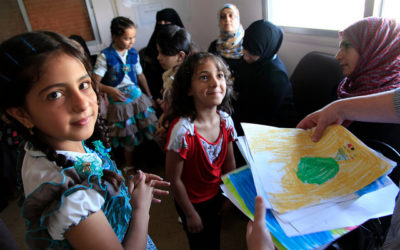Migration as climate adaptation
Should migration be a way of adapting to climate change? As the world warms, our focus moves from how we can reduce emissions, to how we can adapt to life on a warmer planet.
Related video
Climate, migration, neoliberalism
The lecture sketches out a history of neoliberalism, and then looks at how the culmination of this political thinking is reflected in the policies that are being created to address climate change and migration.
Our resources: migration as climate change adaptation
Migration as adaptation, exploring mobility as a coping strategy for climate change, explores the possibility of migrating as a way of coping with climate change impacts, but also examines some of the risks involved in such strategies.
A number of researchers have argued that migration has for centuries been a traditional coping strategy that could be set to increase in the face of climate change. Rather than viewing migration as a last resort these researchers have proposed the idea that migration could become a new way for people to diversify agricultural livelihoods in response to climate change impacts. Such migration strategies give an individual the chance to diversify their income, allows the spreading of risk for the household, and the sending of money back to family members, which would, in turn, increase resilience back home.
However, migration is not a silver bullet when it comes to adaptation. Migrating to pursue alternative livelihoods does not always lead to a more stable life. There are cases where people who move – especially into poor housing in cities – could be exposed to new and different risks.
Even so, migration as adaptation is a policy area that must be given more consideration. Specifically policy makes could consider how they can assist people who wish to move away from risky areas, but are trapped by increasing poverty and livelihood degradation.
For example, support could be funnelled into programmes such as education and information to allow the choice for migration. Consideration should also be given to strengthening and building infrastructure in informal urban settlements where newly arrived migrants often live.
By not addressing migration, development organisations could be devaluing a prominent and important adaptation strategy. They can also serve to further entrench power imbalances and miss out on helping the most vulnerable.
Related video
Climate, migration, neoliberalism
The lecture sketches out a history of neoliberalism, and then looks at how the culmination of this political thinking is reflected in the policies that are being created to address climate change and migration.
Climate change and migration – forced and voluntary movement
Climate change will create forced and voluntary migration. These are two very different things. Get to grips with why this matters.
Climate-linked migration: law and rights
People who move due to climate change are in a legal limbo. Their rights and legal status are not clear. Find out why. Read and watch next... More videos
Paddington: a bear crossing borders
The Paddington Bear stories and film are modern fables about the treatment of refugees. The Paddington film raises important questions about the legal status of people fleeing disasters, and makes a powerful case for the humane treatment of all migrants.
The Task Force on Displacement: the pieces of the puzzle begin to fall into place
The Task Force on Displacement: The pieces of the puzzle begin to fall into place Dr. Sarah Louise Nash Dr. Sarah Louise Nash is 2016/17 Mercator-IPC Fellow at Istanbul Policy Center, Sabanci University and Associated Postdoctoral Researcher in the research group...
Forced migration and the climate change negotiations
Phillip Warren The notion that climate change will cause extensive and largely unprecedented human migration likely comes as no surprise to readers of this blog. Rising seas, changing weather patterns, and increasing frequency and intensity of severe weather events...





